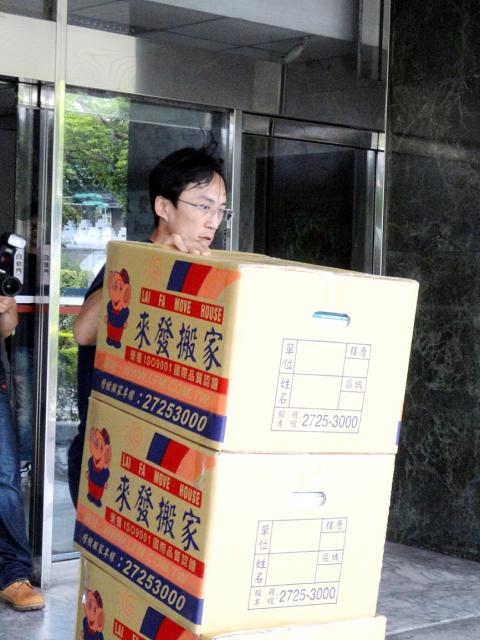In an abrupt about-turn, Premier Sean Chen (陳冲) yesterday approved Minister of Finance Christina Liu’s (劉憶如) resignation letter after she offered to step down on Tuesday, when the Cabinet’s original proposal for a capital gains tax on securities transactions was rejected by Chinese Nationalist Party (KMT) lawmakers.
The approval came less than a day after Chen said he wanted Liu to stay on to help negotiate a new version of the tax that would be acceptable to both the Cabinet and KMT lawmakers.
Chen said Deputy Minister of Finance William Tseng (曾銘宗) would take over Liu’s position until a successor is found.

Photo: CNA
The KMT legislative caucus proposed a new version of the tax late on Monday, called a “dual-track mechanism,” under which investors’ gains from trading securities would be taxed at a rate of between 0.2 percent and 0.6 percent only when the benchmark TAIEX is higher than 8,500 points, if they choose to have the tax based on the level of the index.
Under the Cabinet’s original plan, individual investors would be taxed between 15 percent and 20 percent on their annual gains of more than NT$4 million (US$134,400).
Following a brief meeting with Liu regarding her offer to resign on Tuesday evening, Chen decided to put off a decision on whether Liu should stay or leave until after the tax issue had been resolved.
Executive Yuan spokesperson Hu Yu-wei (胡幼偉) said Chen told Liu that she would have to remain in her position until her resignation had been approved.
On Monday night, Liu told a TV talk show that she had insisted on resigning, but that she would help negotiate a compromise while the Executive Yuan looked for a successor.
However, Liu took a day off yesterday and a removal company was seen picking up packages from her office several times in the afternoon.
Liu tendered a leave-of-absence form to the Executive Yuan to go on leave from yesterday until her resignation had been approved, Hu said.
Chen approved her resignation at 6pm, Hu added.
Meanwhile, Tseng said he would lead the Finance Ministry and manage all the minister’s duties.
“I will ask all my colleagues at the ministry to remain in their posts in the interim period,” Tseng said.
Additional reporting by Amy Su

INVESTIGATION: The case is the latest instance of a DPP figure being implicated in an espionage network accused of allegedly leaking information to Chinese intelligence Democratic Progressive Party (DPP) member Ho Jen-chieh (何仁傑) was detained and held incommunicado yesterday on suspicion of spying for China during his tenure as assistant to then-minister of foreign affairs Joseph Wu (吳釗燮). The Taipei District Prosecutors’ Office said Ho was implicated during its investigation into alleged spying activities by former Presidential Office consultant Wu Shang-yu (吳尚雨). Prosecutors said there is reason to believe Ho breached the National Security Act (國家安全法) by leaking classified Ministry of Foreign Affairs information to Chinese intelligence. Following interrogation, prosecutors petitioned the Taipei District Court to detain Ho, citing concerns over potential collusion or tampering of evidence. The

Seventy percent of middle and elementary schools now conduct English classes entirely in English, the Ministry of Education said, as it encourages schools nationwide to adopt this practice Minister of Education (MOE) Cheng Ying-yao (鄭英耀) is scheduled to present a report on the government’s bilingual education policy to the Legislative Yuan’s Education and Culture Committee today. The report would outline strategies aimed at expanding access to education, reducing regional disparities and improving talent cultivation. Implementation of bilingual education policies has varied across local governments, occasionally drawing public criticism. For example, some schools have required teachers of non-English subjects to pass English proficiency

NEGOTIATIONS: The US response to the countermeasures and plans Taiwan presented has been positive, including boosting procurement and investment, the president said Taiwan is included in the first group for trade negotiations with the US, President William Lai (賴清德) said yesterday, as he seeks to shield Taiwanese exporters from a 32 percent tariff. In Washington, US Trade Representative Jamieson Greer said in an interview on Fox News on Thursday that he would speak to his Taiwanese and Israeli counterparts yesterday about tariffs after holding a long discussion with the Vietnamese earlier. US President Donald Trump on Wednesday postponed punishing levies on multiple trade partners, including Taiwan, for three months after trillions of US dollars were wiped off global markets. He has maintained a 10 percent

TRADE: The premier pledged safeguards on ‘Made in Taiwan’ labeling, anti-dumping measures and stricter export controls to strengthen its position in trade talks Products labeled “made in Taiwan” must be genuinely made in Taiwan, Premier Cho Jung-tai (卓榮泰) said yesterday, vowing to enforce strict safeguards against “origin laundering” and initiate anti-dumping investigations to prevent China dumping its products in Taiwan. Cho made the remarks in a discussion session with representatives from industries in Kaohsiung. In response to the US government’s recent announcement of “reciprocal” tariffs on its trading partners, President William Lai (賴清德) and Cho last week began a series of consultations with industry leaders nationwide to gather feedback and address concerns. Taiwanese and US officials held a videoconference on Friday evening to discuss the